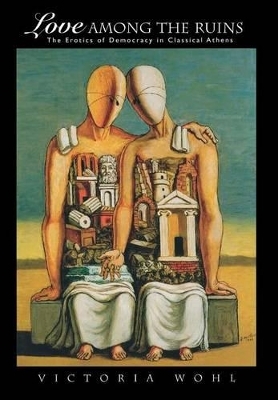
Love among the Ruins
The Erotics of Democracy in Classical Athens
Seiten
2002
Princeton University Press (Verlag)
978-0-691-09522-6 (ISBN)
Princeton University Press (Verlag)
978-0-691-09522-6 (ISBN)
- Lieferbar (Termin unbekannt)
- Versandkostenfrei innerhalb Deutschlands
- Auch auf Rechnung
- Verfügbarkeit in der Filiale vor Ort prüfen
- Artikel merken
Exploring the intersection between eros and politics in democratic Athens, this book traces the private desires aroused by public ideology and the political consequences of citizens' most intimate longings. It shows how desire can disrupt politics and provides an insight into the democratic unconscious of ancient Athens.
Classical Athenian literature often speaks of democratic politics in sexual terms. Citizens are urged to become lovers of the polis, and politicians claim to be lovers of the people. Victoria Wohl argues that this was no dead metaphor. Exploring the intersection between eros and politics in democratic Athens, Wohl traces the private desires aroused by public ideology and the political consequences of citizens' most intimate longings. Love among the Ruins analyzes the civic fantasies that lay beneath (but not necessarily parallel to) Athens's political ideology. It shows how desire can disrupt politics and provides a deeper--at times disturbing--insight into the democratic unconscious of ancient Athens. The Athenians imagined the perfect citizen as a noble and manly lover. But this icon conceals a multitude of other possible figures: sexy tyrants, potent pathics, and seductive perverts. Through critical re-readings of canonical texts, Wohl investigates these fantasies, which seem so antithetical to Athens's manifest ideals.
She examines the interrelation of patriotism and narcissism, the trope of politics as prostitution, the elite suspicion of political pleasure, and the status of perversion within Athens's sexual and political norms. She also discusses the morbid drive that propelled Athenian imperialism, as well as democratic Athens's paradoxical fascination with the joys of tyranny. Drawing on contemporary critical theory in original ways, Wohl sketches the relationship between citizen psyche and political life to illuminate the complex, frequently contradictory passions that structure democracy, ancient and modern.
Classical Athenian literature often speaks of democratic politics in sexual terms. Citizens are urged to become lovers of the polis, and politicians claim to be lovers of the people. Victoria Wohl argues that this was no dead metaphor. Exploring the intersection between eros and politics in democratic Athens, Wohl traces the private desires aroused by public ideology and the political consequences of citizens' most intimate longings. Love among the Ruins analyzes the civic fantasies that lay beneath (but not necessarily parallel to) Athens's political ideology. It shows how desire can disrupt politics and provides a deeper--at times disturbing--insight into the democratic unconscious of ancient Athens. The Athenians imagined the perfect citizen as a noble and manly lover. But this icon conceals a multitude of other possible figures: sexy tyrants, potent pathics, and seductive perverts. Through critical re-readings of canonical texts, Wohl investigates these fantasies, which seem so antithetical to Athens's manifest ideals.
She examines the interrelation of patriotism and narcissism, the trope of politics as prostitution, the elite suspicion of political pleasure, and the status of perversion within Athens's sexual and political norms. She also discusses the morbid drive that propelled Athenian imperialism, as well as democratic Athens's paradoxical fascination with the joys of tyranny. Drawing on contemporary critical theory in original ways, Wohl sketches the relationship between citizen psyche and political life to illuminate the complex, frequently contradictory passions that structure democracy, ancient and modern.
Victoria Wohl is Assistant Professor of Classics at Ohio State University. She is the author of "Intimate Commerce: Exchange, Gender, and Subjectivity in Greek Tragedy".
*FrontMatter, pg. i*CONTENTS, pg. vii*PREFACE, pg. ix*Introduction: Ideological Desire, pg. 1*Chapter I. PERICLES' LOVERS, pg. 30*Chapter II. PORNOS OF THE PEOPLE, pg. 73*Chapter III. PERVERSE DESIRE: THE EROS OF ALCIBIADES, pg. 124*Chapter IV. THE EROTICS OF EMPIRE, pg. 171*Chapter V. WHAT DOES THE TYRANT WANT?, pg. 215*Conclusion, pg. 270*Bibliography, pg. 284*Index Locorum, pg. 313*General Index, pg. 321
| Erscheint lt. Verlag | 15.12.2002 |
|---|---|
| Verlagsort | New Jersey |
| Sprache | englisch |
| Maße | 152 x 235 mm |
| Gewicht | 624 g |
| Themenwelt | Geschichte ► Allgemeine Geschichte ► Vor- und Frühgeschichte |
| Geisteswissenschaften ► Geschichte ► Regional- / Ländergeschichte | |
| Sozialwissenschaften ► Politik / Verwaltung ► Politische Theorie | |
| ISBN-10 | 0-691-09522-1 / 0691095221 |
| ISBN-13 | 978-0-691-09522-6 / 9780691095226 |
| Zustand | Neuware |
| Haben Sie eine Frage zum Produkt? |
Mehr entdecken
aus dem Bereich
aus dem Bereich
auf den Spuren der frühen Zivilisationen
Buch | Hardcover (2023)
C.H.Beck (Verlag)
20,00 €
Konzepte – Methoden – Theorien
Buch | Softcover (2024)
UTB (Verlag)
39,90 €
Was Pompeji über uns erzählt
Buch | Hardcover (2023)
Propyläen (Verlag)
32,00 €


